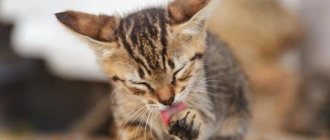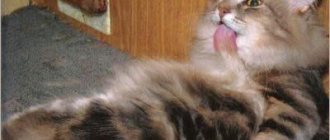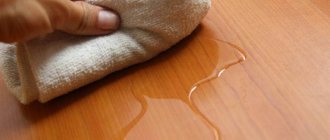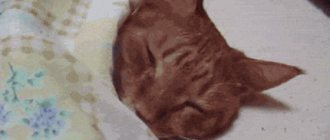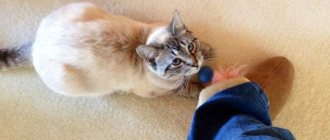Many cat owners have probably watched their pet bury food in her bowl more than once. This picture looks very funny, but not every owner thinks so - for some, this behavior of the pet seems abnormal. It is especially strange to see how an animal hides leftover food in the most secluded corners of the apartment.
There are at least two main reasons why cats bury food: innate instincts or acquired habits.
Saving food for later
A cat buries a bowl of food because that’s what its relatives did many years ago. This behavior is due to the desire to preserve supplies for the future. Outside the house, animals get their own food - for this they have to hunt, but not every hunt ends fruitfully. To avoid starvation, animals save food by burying it.
It is difficult to fight the instinct, and if the owners do not find other reasons for burying, they leave everything as it is.
What does instillation mean in your case?
The animal is often forced to get rid of the bowl by the smell of food that is unacceptable to it. The whole point is that:
- Most cheap dry food has a very strong and unpleasant aroma;
- the mixture quickly becomes damp or spoils if the package is left open for a long time (this often happens when it is taken by weight).
Here the same mechanism is activated that is triggered by the animal after using the toilet - waste products that emit an unpleasant odor are buried deeper so as not to reveal the presence of the cat to large predators.
When an animal lives in the house in the company of other animals, supplies are made in order to guarantee maximum food safety.
The habit itself is the result of a previous negative or positive experience.
Domestic cats become accustomed to the litter box and understand the dangers of a puddle in forbidden places. As strange as it may sound, the rules for eliminating the need directly affect the burying of the bowl. The thing is that in most cases the owners place food and drink nearby. Moreover, recently double feeding containers have gained popularity. Thus, all it takes is for the animal to accidentally push its bowl and the liquid will spill. Accordingly, a puddle appears, and the animal has unpleasant associations with it - and all he can do is eliminate the problem to the best of his ability, that is, simply try to bury it. Therefore, the pet scoops out the food with its paw and sprinkles it on the puddle.
Unpleasant smell of stale food
You can easily notice that cats love cleanliness. They are unlikely to eat food that they do not like. Therefore, if the pet sniffed the bowl and began to bury it, we can talk about the poor quality of the food or its spoilage. The cat does not have the opportunity to throw away its food, so there is nothing left to do but bury it deeper.
Particularly capricious cats bury food that has been left in the air for only 2-3 hours. It is fundamentally important for such animals that they are given only fresh food - the owners may have to feed the shrew several times a day and little by little.
The food smells strong, you need to bury it so that other predators don’t come!
The wild ancestors of modern domestic cats were forced to obtain their own food. They existed in conditions of fierce competition, and in order to preserve their hard-earned food, they had to hide it in safe places that their relatives and other predatory fauna could not reach.
Some of their domesticated descendants have retained this skill, and even when well fed, they continue to bury food: after eating, they scratch the floor next to the bowl with their claws.
Cats usually bury food with a distinct odor, which, in their opinion, can attract predators eager for other people's supplies.
Competition with other animals
One of the reasons why cats may bury food is due to competition with other cats or dogs that share their territory.
In this case, there are two options why the cat buries a bowl of food:
- This can happen if the cat does not live at home alone, that is, several cats or other pets live in one apartment. The instinct of competition awakens in the animal, and it buries a bowl of leftover food so that others do not encroach on its food.
- The reason may be feeding the cat outside (for example, if the owners live in a private house and prefer to place the bowl of food outside the house). In this case, the cat senses that there may be other cats nearby, and instinctively buries the leftover food so that its smell does not attract strangers.
It is worth setting the number of bowls according to the number of “heads”. In some cases, it will be necessary to delineate the place for food - if serious battles break out because of it.
Why do dogs eat feces?
This behavior, called coprophagia, occurs because the dog has diabetes or Cushing's syndrome, which changes its appetite. This can also happen due to nutritional deficiencies. But healthy pets often behave this way. This is explained by the fact that dogs learn this behavior during puppy life, when their mothers eat excrement to keep the “house” clean.
Travel business in a coma: coronavirus has made travel anywhere in the world impossible
Like new: the coffee table was updated and a decorative design was applied to it
Cancer and Virgo: which zodiac sign is most disliked in other countries
Malnutrition
Here we can highlight several aspects related to why the cat does not finish eating and buries the food, leaving it for later.
Perhaps the cat has not been with you since childhood and has lived in poor conditions for some time. Cats that are accustomed to hunger will intentionally leave some of their food behind and try to bury it so that when times get tough, they have a supply that can be found and eaten. The habit is eliminated over the years if the cat lives in satiety and abundance.
If the cat really liked the food or the owner decided to pamper him with something unusual, he may try to hide some of the treats in order to return to the delicacy again later. It is more difficult to deal with such cunning - as a rule, this is part of the pet’s character.
Stress
Like many people, cats experience a lot of stress due to external factors. When an animal experiences anxiety, its appetite decreases and its health worsens. In this case, the cat may try to save food for a time when he feels better and wants to snack. Stress factors can be moving, the arrival of a new pet or small child in the house, as well as rearranging, changing the tray, filler or bowl.
If a cat buries food for no apparent reason, the owner needs to determine what this means as soon as possible so as not to miss the stressful or painful state of his pet.
Instincts
Some experts believe that cats (compared to other domesticated animals) have retained keen ancient instincts. That is, the domestic cat is prone to very wild behavior, and burying food is one of them. There is no need to talk about the need and importance of breathing. Oxygen ensures the vital functions of the body, but it is useless without food and water, since a dead animal does not experience hunger.
The very first and most obvious reason for burying a bowl after a meal is the desire to hide leftover food from competitors and thereby provide one of the basic needs - satisfying hunger . A wild cat does not return with prey from every hunt, and such supplies are literally vital.
The second unconditional instinct that explains burying is the desire for cleanliness . A wild animal, and even more so a predator, cannot give itself away by smell . Firstly, the cat will be smelled by its prey, and secondly, it itself can become a victim of a larger predator. If food has a strong, attractive smell, hiding it is a completely natural desire.
The opposite situation occurs when the cat is very hungry or has not had enough to eat. In the first case, the four-legged animal begins to dig the floor as soon as it eats more than half of the portion; in the second, after finishing the meal. The tailed one tries to "dig up" the supplies from the floor in which they were supposedly buried . The reason is simple, the cat is guided by the unconditional desire for satiety. However, you should not indulge the tailed cat, do not leave food in the bowl and continue to feed the cat on a schedule, gradually increasing the portion and observing the animal’s behavior.
Note! Digging and burying food may not be a constant phenomenon, but only appears in the fall or spring. Everything can be explained by vitamin deficiency, and at the same time an increase in appetite. An equally common cause of constant hunger is parasites, or more precisely, worms.
The cat lives in your home, but at the same time considers the entire territory its property. The pet marks furniture and walls with its scent, and cats tend to mark the perimeter. Natural instincts to keep things clean can result in a desire to clean. The main factor motivating the burying instinct is also the smell, an unpleasant, unbearable, unacceptable smell. The owner is not surprised when the pet buries its “goods” in the tray; when burying a bowl, it can be guided by the same instincts.
Inconvenient bowl location
If your cat buries food, you can assume that this is due to an inconvenient or incorrectly placed bowl. In this case, the cat points out to the owner what does not suit her. Perhaps the cat doesn’t like the smell of the place where it eats, the sounds made by household appliances, or everything is connected with drafts - if the bowl is close to the windows or the front door.
Try moving the plate the cat is eating from. Perhaps after the first or second rearrangement she will stop burying food.
Inconvenient bowl
No matter how strange it may sound, comfort is also important to animals. This also includes the dishes from which the pet eats food. If it is inconvenient for him to eat from the option offered by the owner, then most likely the food in the bowl will be buried until new utensils are purchased.
You need to choose a not very deep cup according to the size of the animal. The preferred material is metal or ceramic. Plastic emits a slight odor, and the cat will immediately refuse it. An automatic feeder can be a good purchase.
Cat disease
Poor health can also cause a cat to bury food, as if storing it for later. Just like people, cats lose their appetite when they are sick. But due to instincts, animals tend to hide food for better times in order to finish it later - and so that the smell does not attract strangers to the bowl.
It is worth paying attention to the cat's health if she begins to malnourish and bury food, while she has signs of decreased activity and other symptoms of illness (fever, discharge from the nose or eyes, problems with the coat). If the alarming condition persists, you should take your pet to the veterinarian as soon as possible.
Causes of the problem
Blood in the urine
This condition is called hematuria in veterinary practice. Mostly the reason lies in the disruption of the urinary system. In addition, the possibility of developing bladder and kidney diseases cannot be ruled out. When sand appears in the organ, over time it forms stones, which begin to move along the urethra, injure the mucous membranes and cause bleeding. In addition, the following factors can provoke a condition where a pet is bleeding heavily:
- worms;
- abnormalities in the structure of the urinary system;
- pathologies of an infectious nature;
- malignant and benign neoplasms;
- injuries.
Presence of blood in stool
When a cat often goes to the toilet with a lot of blood, the following factors are to blame:
The presence of blood in the stool may be a sign that a foreign body has entered the cat's body.
- gastroenteritis;
- ulcer;
- worms;
- intestinal dysbiosis;
- bacterial diseases;
- damage to the rectum or anus;
- allergies;
- blood clotting disorder;
- ingestion of foreign objects;
- poisoning;
- neoplasms.
How to wean a cat from the habit of burying
If the owner managed to find out why the cat buries the food bowl with its paw, and this is not associated with illness, it is necessary to begin the process of weaning the cat from the habit. A hungry animal should be fed heavily, but certainly with fresh food. If your cat doesn’t like a certain type of food, you should switch to a new product.
Each pet should have its own cup - then they will not start competing with each other. All plates should be placed in a calm, warm and comfortable place for pets.
When a cat buries food, it not only makes annoying noises, but can also damage the flooring - many owners don't like this. In this case, it is necessary to trim the animal’s claws or acquire special anti-scratch guards, since the weaning process may take a long time.
If you can’t fight the burying instinct, place a mat under the cat’s bowl that protects the floor from his claws and absorbs the noise of scratching.
Do you like the article? 124
Unconditioned reflexes and their role
Every living creature and species survive thanks to unconditioned reflexes, that is, skills that an animal acquires “by inheritance.” Cats hunt because they know how and want to do it “by nature.” Purring, stomping, gently hitting your hand or face is also an instinct, this is how pets express their feelings, communicate and convey their smell to you.
There are a number of deep, unconditioned reflexes that control the survival of the animal as a whole:
- Breathing, coughing, sneezing.
- Sucking, chewing, hiccups, vomiting. By the way, when a cat gently tramples you with its paws, this is also an instinct associated with sucking milk. Kittens stimulate the flow of milk to the glands by massaging the mother's belly.
- The desire for security and peace is the ability and ability to protect oneself. This also includes the desire for a neutral smell and cleanliness.
- The desire to imitate and flock.
- Sexual hunting and parental instinct. A mother cat can not only bury food, but also hide it in unexpected places. A piece of meat may end up behind a heating radiator or refrigerator, and this fact will be detected by a rotten smell.
